




















By Grantlee Kieza OAM, Industry Reporter
The Gold Coast Management and Le ing Rights (MLR) industry has experienced significant changes in recent years due to rising real estate values and increasing sales to owneroccupiers rather than investors.
While these trends have pressured business multipliers, the market remains robust and adaptable, with experts expressing confidence in its ongoing resilience. This report, featuring insights from industry professionals, explores the evolving dynamics of the Gold Coast MLR market and its prospects.
From an operator's perspective, the sector has faced considerable challenges in recent years, said Bryan Fitzpatrick, Managing






Bryan Fitzpatrick
Director of Dreamtime Resorts. He shared the main di culties he has encountered. “First, it was COVID-19; now it's rising interest rates and economic pressures – who knows what tomorrow's challenge will be?” he said, highlighting the need for operators to be prepared to adapt in an “ever-changing market”. Mr Fitzpatrick noted that current economic conditions present the biggest hurdle, with reduced leisure travel and tighter discretionary spending intensifying market competition. Consequently, operators are under increasing pressure to compete on price to secure bookings.
Despite these challenges, Mr Fitzpatrick has observed some encouraging trends, such
as a shi back to pre-pandemic booking pa erns. While this represents a slowdown from the post-lockdown travel surge of the past two years, he said it suggests a return to more predictable market conditions. “We’re also noticing changes in traveller behaviour, with shorter stays becoming more common, but overall interest remains strong,” he added. Although the impact varies across properties, Mr Fitzpatrick pointed out that, despite evolving trends and economic pressures, le ing pools have remained stable, showing minimal e ects from the shi ing market dynamics.






Michael Philpo of MR Sales acknowledged that current market trends and conditions are impacting MLR sales on the Gold Coast-Tweed. He explained

We are dedicated to the strata sector With a deep industry understanding, we know the way to your strata solutions





that the rising value of real estate has created downward pressure on multipliers for management rights to maintain a ractive returns on investment (ROI). For example, a three-bedroom unit purchased for $580,000 in November 2021 saw its value increase by 49 percent by September 2024, a trend seen across the market. This rapid appreciation in property prices has resulted in a typical drop of one multiple in many cases, allowing management rights to still o er viable ROI despite higher costs.
Another factor a ecting MLR business sales is the shrinking pool of available rental accommodation, as more owner-occupiers move into complexes, particularly in the two- and three-bedroom categories. This shi has further tightened rental supply, adding another layer of complexity to the market. However, he pointed out that rental rates have increased by 12.8 percent for investors over the past three years, based on SQM Research data, reflecting a positive trend amidst the challenges.
Mr Philpo also addressed the growing trend of decoupling – separating management rights from real estate ownership. While this practice has become more common due to the rising value of property, he cautioned that it could be “very detrimental” to the
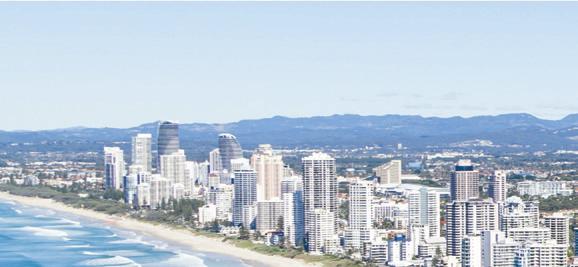

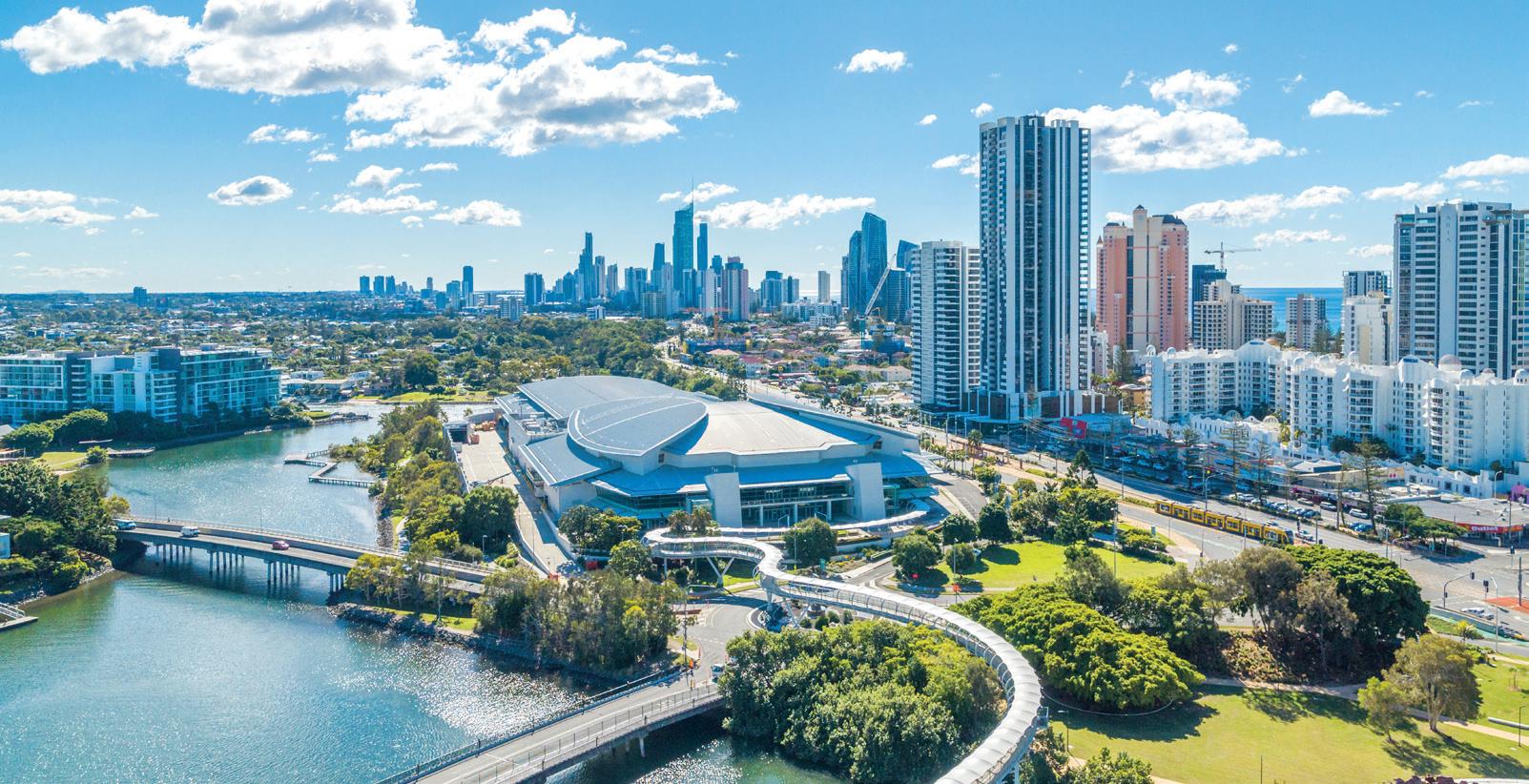
industry's long-term health. Traditionally, management rights involve the onsite manager residing within the complex, fostering a sense of community and ensuring higher tenant standards compared to external agents. “Decoupling weakens this arrangement, as managers without a unit in the complex may lose the ability to influence crucial decisions, such as renewing management agreements,” he said.
Despite these shi ing dynamics, Mr Philpo remains optimistic about the future of MLR on the Gold Coast-Tweed, predicting that the sector will continue to “power along”.
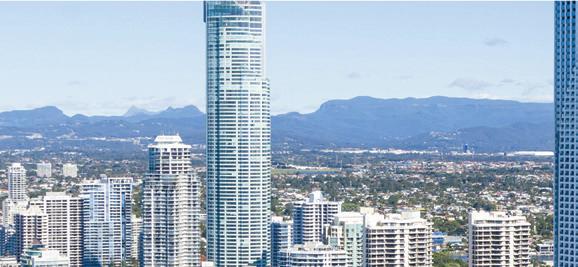

He acknowledged that management rights would undergo significant changes but believes they will continue to be a vital component of the accommodation industry.
“As more strata complexes are built, the benefits of onsite managers will increase,” he said, noting that capital appreciation is generally higher in complexes with onsite managers.
He also highlighted that smaller complexes are experiencing notable gains in property values due to limited supply, which has led to a typical reduction of one multiple to counterbalance the increased real estate values while still delivering the required ROI for management rights opportunities.

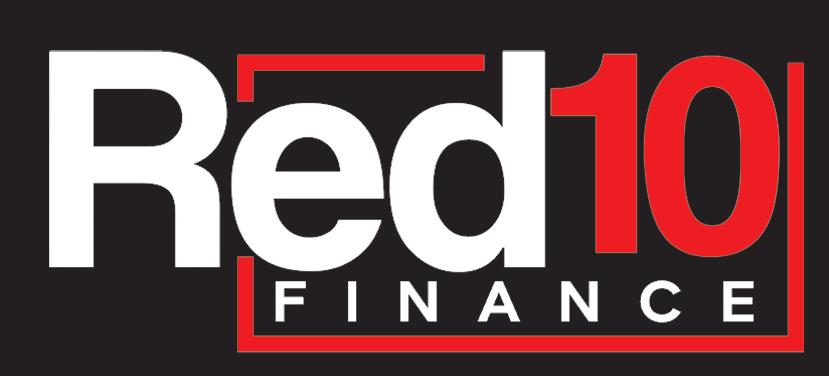

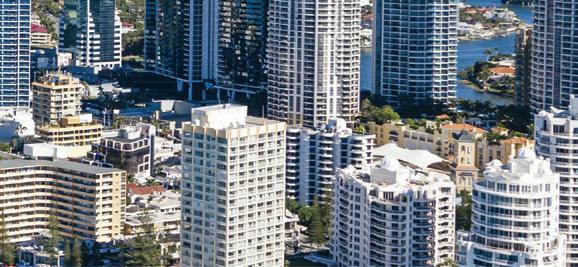

















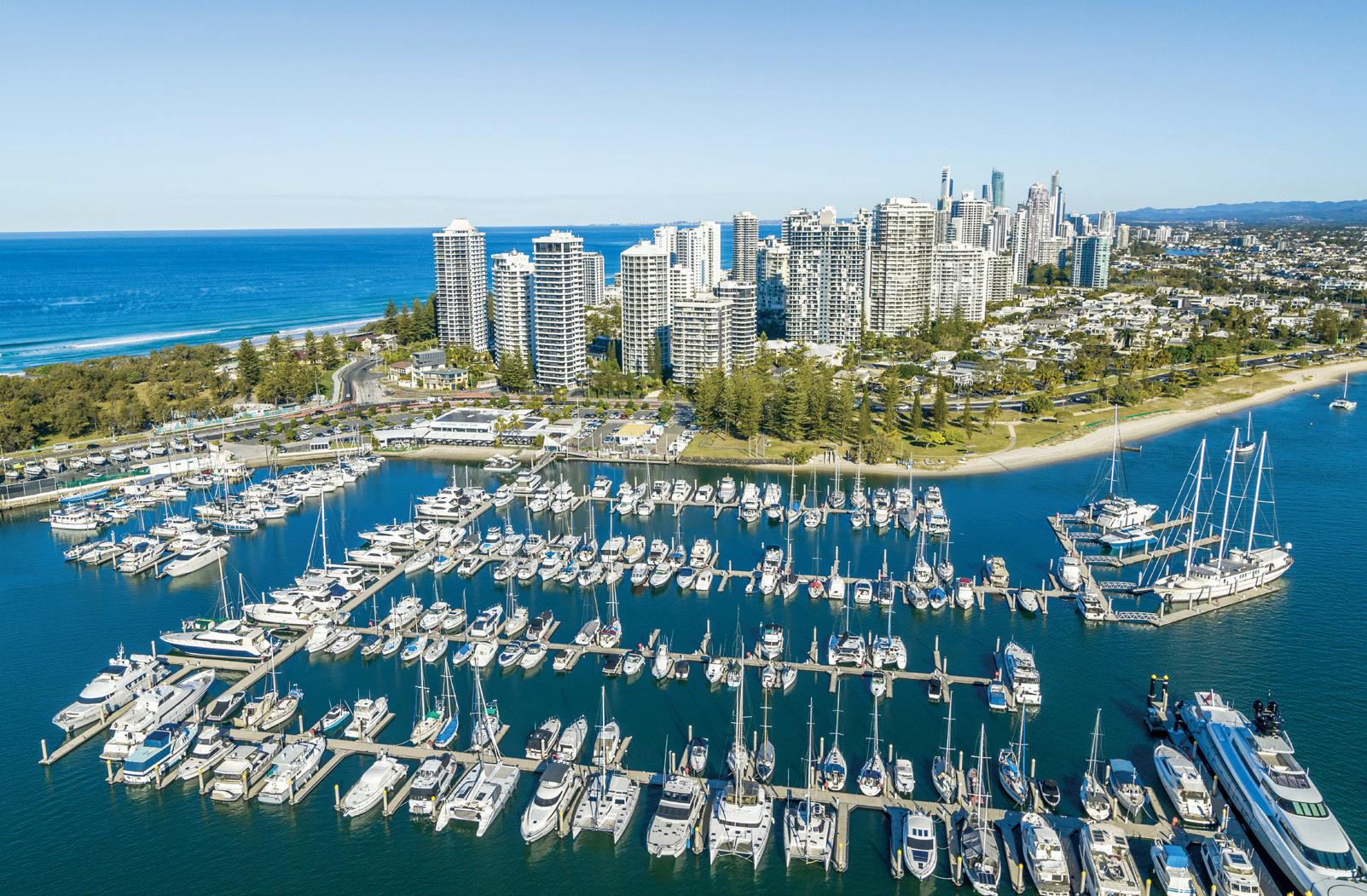
Economic pressures are expected to drive further consolidation, with more outsourcing and strategic roles, such as hands-on yield management for short term lets and strategic oversight for longerterm properties, becoming essential.
Larger management rights businesses will be be er positioned to leverage economies of scale and adopt advanced technology for improved management. Mr Philpo noted that a well-supported property manager could handle 270 long term rentals, while short term lets would require additional resources but could manage around 100 units with technological support like smart locks and enhanced communication systems.
The market forces driving consolidation will particularly a ect smaller complexes, as many lenders view net profi ts below $150,000 as too risky to finance. Without other factors to de-risk loans, such as higher equity or external income, smaller MLR businesses may find it di cult to secure financing.
Mr Philpo observed that current buyers in the MLR market are typically seeking flexible, lifestyle-oriented opportunities with no fi xed hours and the ability to be on call.
He shared that his company has several well-priced listings catering to a range of prospective buyers' needs. These include properties such as a $1.935 million listing with a multiplier of 3.15 and an ROI of 16 percent, a $3.47 million listing with a multiplier of 5.7 and an ROI of 11.6 percent, a $3.6 million property with a multiplier of 5.6 and an ROI of 15 percent, and a $1.045 million listing with a multiplier of 2.18 and an ROI of 13 percent.
To summarise he stated that the interplay of rising property values, evolving rental markets, and shi ing business practices is reshaping the MLR landscape on the Gold Coast. Operators will need to adapt to these changing conditions, with a focus on sustainable ROI, strategic management, and technological integration to stay competitive. However, the future looks bright, with opportunities for growth and innovation keeping the sector wellpositioned for continued success.
Bobo Qi of Property Bridge, echoed Mr Philpo ’s “future looks bright” sentiment observing a marked improvement in market activity since September.



“The Gold Coast MLR market is definitely ge ing brighter a er a relatively sluggish start to the year,” she said. “Since September, we've seen more enquiries and increased activity compared to the beginning of the year. I think people are starting to feel more confident about the possibility of interest rates being reduced.
“I have a lot of confidence in the current market trends. Furthermore, there has been an uptick in buyer enquiries from interstate as well as New Zealand. While permanent le ing businesses remain stronger than holiday le ings, we are seeing demand for both.”

Paul Mueller, a senior broker at Ras360, echoed the sentiment that the Gold Coast management rights market appears strong heading into the last quarter of the year. However, he also highlighted the significant shi within the sector of the steep rise in the value of managers' residences, which is pu ing substantial pressure on business multipliers.
“This change has disrupted the balance managers once enjoyed, making it critical for sellers to adjust their expectations,” he explained. “At one time, you could have your cake and eat it, but that’s no longer the case. While strong returns are still achievable, it now requires a more sophisticated understanding of current market dynamics. Sellers must recognise that despite these changes in multipliers, buyers are still primarily focused on consistent ROI metrics, which should remain the key consideration when pricing and selling management rights.”
Mr Mueller further noted that the market is returning to normal a er the inflated

multipliers seen during the pandemic’s 'Long Stay Boom,' particularly in the permanent management rights sector. Ras360 has successfully adapted to these changes, se ling and pu ing properties under o er at a rate of one per working day across both the real estate and accommodation sectors.
“The market remains full of opportunities for those ready to adapt to these evolving trends," he said, positioning Ras360 as a leader in helping clients capitalise on these developments.
“Now is an ideal time to invest in this dynamic sector,” he concluded.






With an equally optimistic outlook, Todd Warner, senior broker at ResortBrokers, reinforced the Gold Coast management rights market's strength and diversity.
“With over 1000 schemes, it’s the second-largest market in the country a er Brisbane,” he said, pointing out that both large and small businesses continue to transact, and that o -the-plan projects are progressing steadily despite economic challenges.
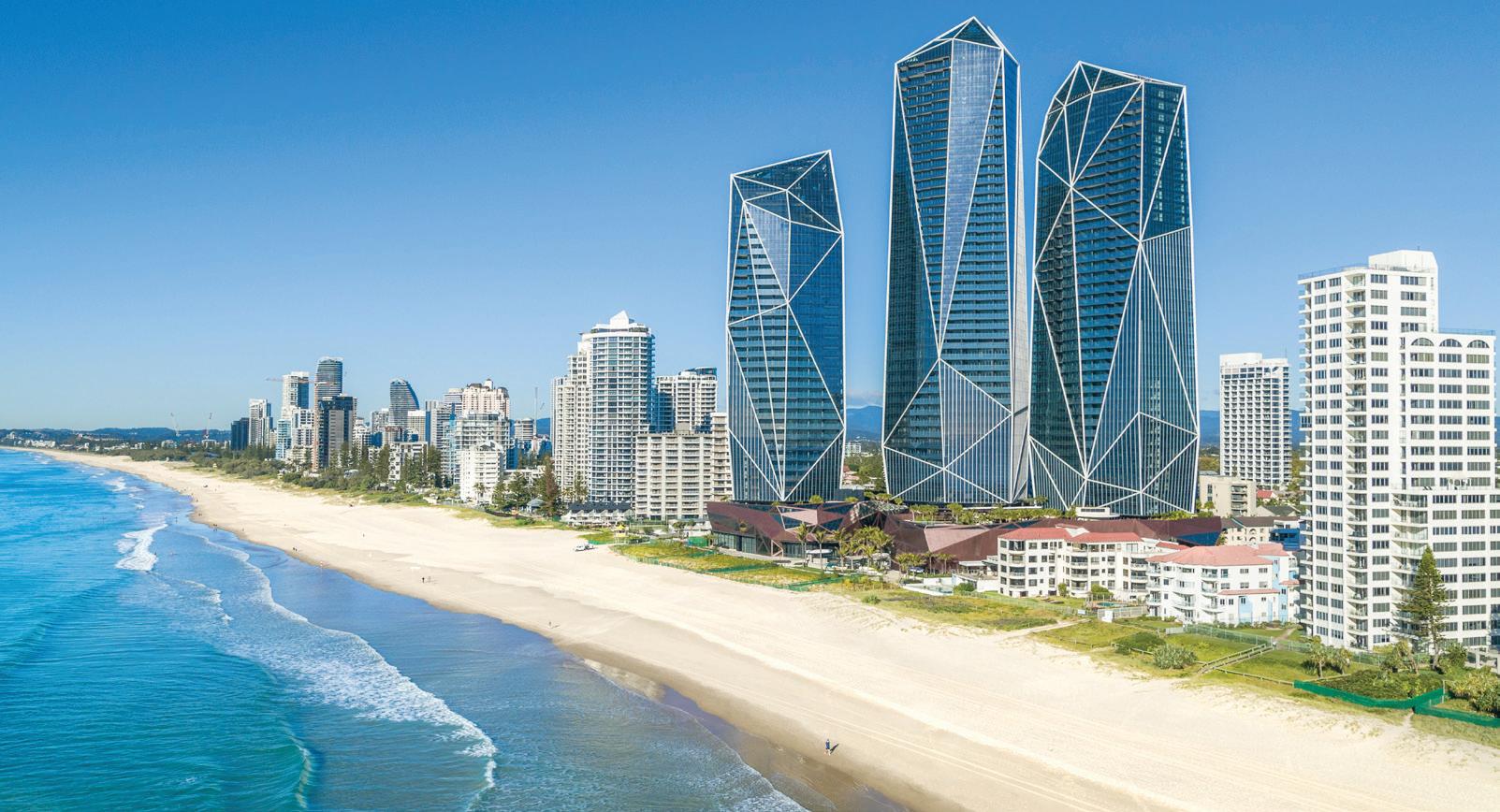
Mr Warner highlighted a robust transaction volume, including 19 of his own business se lements last financial year, se ing a company record with $1.325 million in commissions. “Four of my transactions were major deals worth over $7 million each, signalling that high-end properties are starting to change hands more frequently,” he noted. “The momentum continues into FY24, with 18 deals of mine already under contract in the first quarter, reflecting a shi as operators who navigated the postCOVID-19 boom seek to transition into a more typical business environment.”
He emphasised that the market is in a “really healthy place” due to its broad and diversified
nature. “We market and sell management rights at all levels—from small businessonly schemes and high-net holiday lets to high-value permanent residential lets. There are active buyers across the spectrum, from large corporates like Ultiqa, Accor, and Minor to family operators looking for a secure business and a nice home,” he explained.
Mr Warner also mentioned that he has “three cracking listings” available, including Currumbin Ridge, Eastlake, and Villas Tijuana in Robina, demonstrating the variety of opportunities in the market. He added, “We’re seeing sustained interest from international buyers, particularly from South Africa, New Zealand, China, and broader Asia.” P48


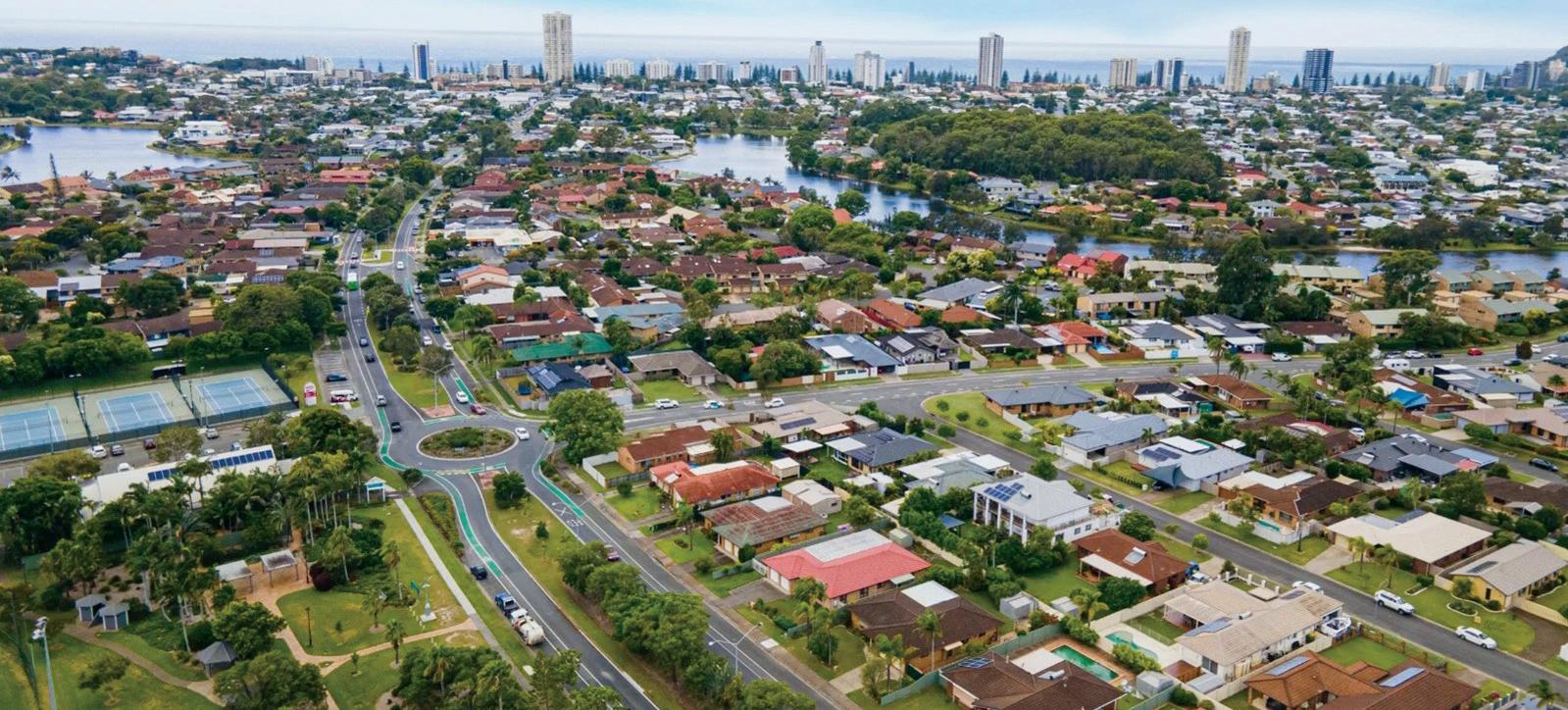



■




■
■

Property Bridge and team are honoured to receive the ‘Sales Brokerage of the Year’ award for 2024, as presented by the Australian Resident Accommodation Managers Association (ARAMA).
We are a proud ARAMA supporter, and recognise the immense contribution in supporting, educating and advocating for the Management Rights industry.



Be our partner in success and contact us now should you be entering the market to sell or purchase Management Rights
As the industry evolves, Mr Warner noted a significant shi towards prioritising ROI over traditional multipliers.
“Historically, it was all about multipliers, but now, with record-high interest rates and booming residential prices, the balance between business value and real estate price is crucial to make ROI align with buyer and lender expectations,” he said. “In today's market, sellers can’t expect record multipliers for record net profits when property prices have surged. However, for schemes that are business only or have a lower real estate component, great multipliers are still achievable.”
Overall, the Gold Coast’s diversified economy, population growth, and varied buyer interest contribute to a thriving management rights market, o ering opportunities across all levels.



Craig Johnson of Hotel Resort Sales reflected on a notably quiet winter. “Winter 2024 has been one of the quietest I’ve experienced for MLR enquiries on the Gold Coast,” he said. “However, enquiries have been steadily increasing with the arrival of warmer weather.”
Mr Johnson noted that activity has been tracking well, and interestingly the enquiries coming through of late have been from more qualified buyers, genuinely interested in purchasing rather than people that are simply browsing. “If we receive positive news on interest rates in the coming months, it will further boost market confidence, and I’m optimistic that we’re on track for a strong year ahead,” he added.
Hotel Resort Sales has a range of MLR listings including the holiday management rights for Windsurfer Resort in Biggera Waters, priced at $1.64 million with a net income of

$231k, along with the exclusive beachfront Deville Resort at Main Beach, listed at $3.37 million with a net income of $420k. Sco Saunders from Premier Business Sales highlighted the continued appeal of well-located, high-net management rights complexes on the Gold Coast, particularly those supported by guaranteed body corporate salaries. “Everybody in the management rights industry is waiting for interest rate reductions, and hopefully, they'll come soon,” he said. “The larger complexes are still very popular –anything ne ing over $400,000 is highly a ractive to buyers, with prime locations like Burleigh Heads, Coolanga a, and Broadbeach consistently drawing interest.”
Mr Saunders is currently marketing the management rights for Solnamara Apartments on the Esplanade at Burleigh Heads and the high-earning Golden Riviera, which features direct beach access at Tugun.
He said: “These listings reflect the ongoing preference for well-located, higher-net properties in the market.”


Seeing things from both sides of the market – preparing financial verification reports for buyers and compiling sales figures for clients looking to sell – David Jackson, a partner at Hospitality & Strata, o ered insights into the market's current challenges from an accounting and auditing perspective.
He observed that while sales activity typically

picks up a er June 30, the recent July to September period has been notably slow. “We've prepared a fair number of sales figures, but the market has been sluggish. The majority of those properties have not sold, and some owners have opted to take their businesses o the market,” he said.
Mr Jackson a ributed this slowdown less to borrowing rates, which are around 8 percent, and more to issues with le ing pool numbers. “The real problem is the le ing pool,” he explained. “With the housing shortage, units for sale are o en purchased by residents rather than investors, limiting the availability of properties for le ing pools.”
While le ing pool numbers have not increased, Mr Jackson noted that they have at least remained stable in some cases. “For most managers, the trend is flat at best, with many experiencing declines. This is likely discouraging potential buyers," he added, expressing doubt that Gold Coast MLR businesses are worth more than a multiple of six. “Once you get into the sixes, the rate of return is hard to justify, especially given the ongoing pressure on le ing pool numbers.”

Cameron Wicking and Paul Grant from Mike Phipps Finance highlighted some common industry trends. They noted that MLR prices for complexes with smaller net profits are beginning to so en. “It seems to be following the trend on the Sunshine Coast, perhaps six months behind,” Mr Wicking explained. “We’re seeing a shi towards more yield-based valuations rather than relying solely on standard multipliers.”
Mr Wicking added that larger complexes continue to perform well, with strong transaction volumes and solid support at higher earnings levels. “The real challenge is with smaller assets, which are feeling the squeeze due to the business-to-real-estate ratio and persistently high property values.”

Paul Grant observed that while smaller operations are still selling, the buyer demographic is changing. “The traditional 'mum and dad' operators working full-time in these assets aren't as common as they used to be,” he said, “but at the higher end, the multiples remain very solid.”

Nick Smith of Red10 Finance echoed similar views, noting a slowdown in transaction activity over the past 18 months. “The pace has definitely slowed, but it's still a buoyant market,” he said. “The Gold Coast resort market has always had its own unique identity, operating
like a bubble within the broader economy. The right properties are still being sold, whether for residential or business use.”
While many transactions continue, Mr Smith acknowledged that volumes have declined compared to the post-COVID-19 surge. “We still see a range of businesses selling – holiday, permanent, and caretaking arrangements, which are particularly popular right now,” he explained.
He identified skyrocketing unit prices as a key challenge, stating: “People are now more focused on overall ROI, typically between 12 and 15 percent, which is likely where it should be. This shi in focus is impacting multipliers.”
Looking ahead, Mr Smith expressed optimism about anticipated interest rate cuts, suggesting that a forecasted one percent reduction within the next 12 months could “make a massive impact on the market. A drop would accelerate activity and bring momentum back into the sector”.

Jonathan Hanaghan from Count Gold Coast Accounting added to the discussion by noting that, despite some market challenges, conditions remain “relatively strong.” He commented, “I don't think interest rates have had as much of an

impact as many expected. Multipliers are still holding up well, particularly in the permanent management rights space, ranging from four to six and a half.”
However, he observed a shi in demand for large holiday apartments. He said: “The appetite for these properties has changed since the pandemic. Average nightly rates have been much stronger, boosting net incomes, but I think there's a realisation
that this level may not be sustainable. Where a room once cost $200 a night, it might now be $400, and people are starting to recognise that those rates – and the associated income – may not hold.”
He also noted that the surge in Australian tourism, driven by closed international borders, had temporarily increased demand and rates. However, as the market returns to normal, nightly rates may also stabilise at more typical levels.





Ma hew Manz of Mahoneys Lawyers described the Gold Coast market as “a li le bit lumpy,” with periods of high activity followed by quiet spells. “I've noticed a glut of transactions, then things slow down again,” he said.
“Interest rates have introduced some uncertainty, and it'll be interesting to see what happens when they come down.” Mr Manz also observed a trend of buyers acquiring smaller, caretakingonly management rights businesses and consolidating them into a portfolio without purchasing the associated real estate.



Property lawyer Frank Higginson, a partner at Hynes Legal, rated the market as “steady”. He noted a mix of long stay and short stay complexes in the transactional landscape. “The Gold Coast is facing the same challenges as other regions,” he explained. “The value of real estate in smaller transactions o en poses a financing hurdle because debt servicing on non-income-producing assets makes borrowing di cult.”
He highlighted the increasing prevalence of clawbacks in deals. “While clawbacks in permanent complexes are relatively straightforward, valuing short stay apartments – especially with varying unit types – can be more of an art than a science. Still, deals are ge ing done.”

Trent Pevy, director of Pevy Lawyers, echoed the views of his colleagues but noted that selling clients appear to be on the market for longer than they used to.
“It used to be that many properties would sell immediately or o -market,” he said. “Now, many of our clients are experiencing longer times on the market.”
He emphasised the need for sellers to be be er prepared. “Due diligence has become much more stringent,” he explained. “In the past, deals rarely fell through once figures were satisfied, but now more and more are encountering issues arising through the legal due diligence process.”
Alison Sun from AccomValuers noted that the Gold Coast market for very small MLR businesses is “very quiet”. She explained that long-term and holiday let complexes







with net operating profi ts (NOPs) below $200,000 are slow to sell. “The cost of money – specifically, rising interest rates – is a significant factor,” she said. “Servicing such a small income stream is challenging enough, and when you add the cost of real estate, it becomes even tougher.”
She observed that MLR businesses yielding less than a 14 percent ROI are experiencing low demand. However, in the long term le ing market, businesses with NOPs over $200,000 are still performing well. “The category above $600,000 in NOP has seen strong multipliers, ranging from 6 to 6.9,” she added.
In the short term le ing market, Ms Sun noted that multipliers for properties with NOPs between $200,000 and $400,000 have remained steady. “The $400,000 to $600,000 NOP segment has so ened slightly, with the highest multipliers for that range dipping below the levels seen last quarter,” she said.
Ms Sun also highlighted that the volume of sales in the short term sector is lower compared to the more active long term le ing market. She pointed out that while MLR businesses traded “really well” post-COVID-19, the subsequent e ects are now beginning to “hurt wallets”.
“With nightly rates at a premium, people aren't travelling as much, and if confidence in short-term le ing continues to wane, rates will inevitably take a hit,” she warned.
She cited a recent sale of a complex in Surfers Paradise, which ne ed over $600,000, with the management rights selling at a core multiplier of 5.8, including leasebacks. Another complex in Burleigh Heads, which ne ed over $1 million last year, achieved a multiplier of 6.3.
Meanwhile, Tod Gillespie from valuers Herron Todd White described the Gold






Coast market as “very mixed.” He explained, “Vendors' expectations o en don't align with market realities, and unless they're willing to heed the advice of valuers and agents, they may find it di cult to sell.”
Mr Gillespie pointed out that unit prices have risen significantly, but many managers overlook the fact that, while typical buyers may be emotional and willing to pay a premium, a manager's unit is primarily assessed based on ROI.
Regarding the strategy of decoupling a manager's unit from the business to achieve a premium sale, he warned that this approach carries risks. It could negatively impact the business if the manager loses the right to put a motion forward at an AGM to request an option to extend caretaking and le ing agreement terms.
“Unless managers are confident they have support from owners or the body corporate commi ee to submit a motion on their behalf, the term may not be extended, devaluing the business,” he concluded.
Despite various challenges, including fluctuating market conditions and a housing shortage, the Gold Coast's MLR market remains resilient and adaptable. Population growth, economic diversification, and a steady influx of visitors contribute to ongoing demand for accommodation. With projections indicating continued expansion, the sector will likely see benefi ts from strategic consolidation, adoption of advanced technologies, and a focus on optimising ROI.
Although hurdles remain, especially with housing approvals lagging behind demand, the outlook for the MLR industry is positive, driven by a proactive approach and an ability to capitalise on the region's growth trajectory and appeal.
